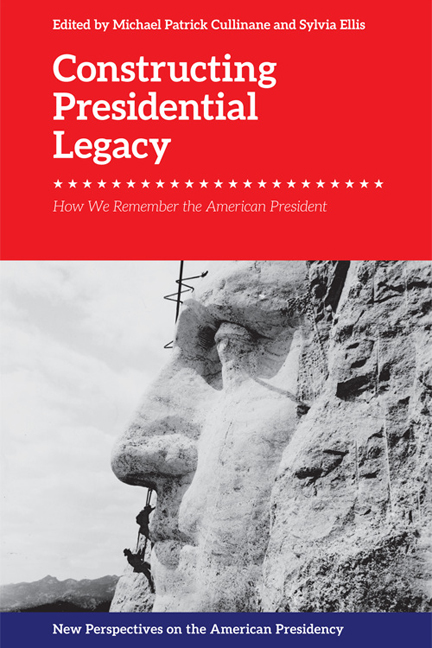Book contents
- Frontmatter
- Contents
- Acknowledgments
- Notes on Contributors
- An introduction to Presidential Legacy
- 1 Presidential Temples: America’s Presidential Libraries and Centers from the 1930s to Today
- 2 Presidential Legacy: A Literary Problem
- 3 Pennsylvania Avenue meets Madison Avenue: The White House and Commercial Advertising
- 4 Eisenhower’s Farewell Address in History and Memory
- 5 Pageantry, Performance, and Statecraft: Diplomacy and the Presidential Image
- 6 “You’ve got to decide how you want history to remember you”: The legacy of Lyndon B. Johnson in film and Television
- 7 The Farewell Tour: Presidential Travel and Legacy Building
- 8 Reflecting or Reshaping?: Landmark Anniversaries and Presidential Legacy
- 9 From a “New Paradigm” to “Memorial Sprawl”: The Dwight D. Eisenhower Presidential Memorial
- 10 Top Trumps: Presidential Legacies, New Technologies, and a New Generation
- Epilogue: Confessions of a Presidential Biographer
- Index
10 - Top Trumps: Presidential Legacies, New Technologies, and a New Generation
Published online by Cambridge University Press: 01 May 2021
- Frontmatter
- Contents
- Acknowledgments
- Notes on Contributors
- An introduction to Presidential Legacy
- 1 Presidential Temples: America’s Presidential Libraries and Centers from the 1930s to Today
- 2 Presidential Legacy: A Literary Problem
- 3 Pennsylvania Avenue meets Madison Avenue: The White House and Commercial Advertising
- 4 Eisenhower’s Farewell Address in History and Memory
- 5 Pageantry, Performance, and Statecraft: Diplomacy and the Presidential Image
- 6 “You’ve got to decide how you want history to remember you”: The legacy of Lyndon B. Johnson in film and Television
- 7 The Farewell Tour: Presidential Travel and Legacy Building
- 8 Reflecting or Reshaping?: Landmark Anniversaries and Presidential Legacy
- 9 From a “New Paradigm” to “Memorial Sprawl”: The Dwight D. Eisenhower Presidential Memorial
- 10 Top Trumps: Presidential Legacies, New Technologies, and a New Generation
- Epilogue: Confessions of a Presidential Biographer
- Index
Summary
In the last two decades presidential campaigning has been transformed by new media technologies. Presidential legacies in the twenty-first century take shape and evolve in cyberspace. The proliferation of websites—from those of presidential libraries to those of conspiracy theorists—provides endless information. Donald Trump's routine tweets show how powerful Twitter can be as a source of information, not to mention Instagram, Snapchat, Facebook, and other social networking sites (SNSs). All kinds of publicity campaigns have taken advantage of the new media landscape, and the gaming industry contributes to our impression of former presidents as well. Bestselling games like Sid Meier's Civilization series or the Call of Duty franchise (and soon virtual reality) bestow action-hero status on former presidents and demonstrate how chief executives are, and will be, increasingly accessed via digital media. There has never been more information and disinformation on the American presidents readily available to scholars and the public alike.
This chapter focuses on how the memory and legacy of US presidents is mediated for the so-called “digital natives” and “digital immigrants” who are gathering information and reading history in new ways. At this stage in the early history of new media technologies, we can begin to discern some patterns and trends emerging from their use, and to assess how presidents have embraced these innovations. We can also learn more about the impact new media has had on public relations and consider how presidential legacies are changing as digital innovations influence people living in the post-truth world of the Trump presidency. The chapter argues that presidential legacy currently lies in an entirely new paradigm, one in which the lines between fiction and reality have blurred even more than before, and maintains that this is owed to the advent of new media.
The advent of new technology
Recognizing the advantages of speaking directly to the American public, presidents have long embraced new communications technologies, but some occupants of the White House showed varying degrees of enthusiasm. Although patented by Samuel Morse in 1837, antebellum presidents rarely used the telegraph. Abraham Lincoln (1861–65) was the first to use it regularly. In June 1877, just over a year after Alexander Graham Bell patented the telephone, Rutherford B. Hayes spoke to him over the wires while staying at the Rocky Hotel in Warwick, Rhode Island (Bell was thirteen miles away, in Providence).
- Type
- Chapter
- Information
- Constructing Presidential LegacyHow we Remember the American President, pp. 258 - 276Publisher: Edinburgh University PressPrint publication year: 2018



